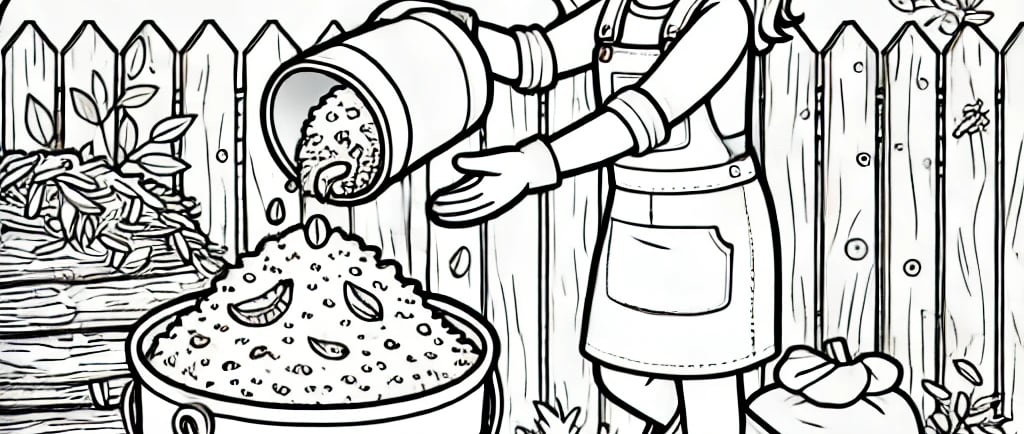Composting Techniques
How to Create Nutrient-Rich Soil Using Your Garden Waste
Mary
4/3/20253 min read


Hi everyone, it’s Mary from Will’s Garden! 🌿
Last week, we talked about attracting beneficial insects to help balance your garden’s ecosystem naturally. This week, we’re diving into another essential gardening practice—composting!
Creating your own compost is one of the easiest and most rewarding ways to build rich, healthy soil, reduce household waste, and boost your garden’s sustainability. Whether you're just getting started or looking to fine-tune your technique, I’ll walk you through composting basics and tips to turn your kitchen and garden waste into nutrient-packed black gold for your plants!
🌱 Why Compost?
Composting transforms organic waste into a natural, nutrient-dense fertilizer that helps your garden thrive. Here are some amazing benefits:
✅ Enriches soil – Adds vital nutrients and improves soil texture and structure
✅ Reduces waste – Keeps kitchen scraps and yard debris out of landfills
✅ Supports beneficial microbes – Encourages healthy soil life for vibrant plant growth
✅ Improves moisture retention – Helps soil hold water, reducing the need for frequent watering
✅ Suppresses disease – Promotes a balanced ecosystem that naturally deters pests and pathogens
🧺 Getting Started with Composting
Don’t worry—it’s easier than you think! The key is balancing greens (nitrogen-rich) and browns (carbon-rich) to keep the composting process moving smoothly.
1. Choose Your Composting Method
Depending on your space and lifestyle, there are several composting methods to consider:
Traditional Compost Pile – Perfect for larger gardens. Just pile up organic materials and turn them occasionally.
Compost Bin (Outdoor) – A tidy, contained solution that helps regulate moisture and temperature.
Kitchen Countertop Bin – Keep this handy by the sink to collect daily scraps. When full, transfer it to your outdoor bin or pile. I use this countertop bin (Barnyard Designs Compost ) and love how convenient it makes composting!
Tumbler Composter – A rotating bin that speeds up decomposition by making turning easy. I recommend this outdoor tumbling composter (Vivo Sun Outdoor Composter) —it’s sturdy, easy to use, and gets the job done fast.
Vermicomposting (Worm Bin) – Uses red wigglers to break down food scraps into ultra-rich castings. We like to get ours from Nature’s Good Guys (Red Worms) —super healthy worms and great customer service!
Bokashi Composting – An anaerobic, fast-decomposing indoor method that uses special microbes to ferment kitchen waste. This Bokashi indoor system (Starter Kit ) is a great starter kit if you're short on outdoor space.
2. What to Compost (and What to Skip)
Here’s a quick cheat sheet:
✅ Compost These:
Fruit and vegetable scraps
Coffee grounds and filters
Eggshells
Grass clippings and dry leaves
Shredded newspaper and cardboard
Plant trimmings, garden waste
Manure from herbivores (like chickens and rabbits)
❌ Avoid These:
Meat, dairy, and oily foods (they smell and attract pests)
Pet waste (may contain harmful bacteria)
Diseased or pest-ridden plants
Treated wood or synthetic materials
Large branches (unless chipped first—they take forever to break down)
🔄 Composting Tips for Faster Breakdown
Want that rich compost sooner? Try these easy tricks:
✅ Chop it up – Smaller pieces decompose quicker
✅ Turn regularly – Aeration speeds up the process
✅ Maintain moisture – Think “wrung-out sponge” damp, not soaked
✅ Balance greens & browns – Layer food scraps with leaves, straw, or paper
✅ Cover your pile – A tarp or compost lid helps retain moisture and heat
🌻 Using Your Finished Compost
When your compost is dark, crumbly, and smells like fresh earth, it’s ready! Here’s how to use it:
Mix it into garden beds before planting
Top-dress around plants for a slow-release nutrient boost
Brew compost tea by soaking a shovelful in water—perfect for container gardens
Add to potting soil for healthier houseplants and seedlings
🌿 Final Thoughts
Composting is such a rewarding habit. You’re turning everyday waste into something valuable and alive—nutrient-rich soil that supports everything you grow. By composting, you're not only reducing waste, but also giving your garden the love it needs, naturally and sustainably.
Next week, we’ll explore natural ways to improve soil drainage and aeration—a key to healthier roots and stronger plants!
Until then, happy composting, and let’s keep growing together!
Mary from Will’s Garden 🌱💚♻️
BTW All links in this blog are for Amazon and as an Amazon Associate I earn from qualifying purchases
Solutions
Collect rainwater efficiently with our innovative systems.
Sustainability
Quality
info@willsgarden.com
1-508-375-3600
© 2025 All rights reserved.
